The annual briefing by the embassy of Kazakhstan in Ashgabat for the diplomats and the media was held on 13 December 2019.
Ambassador Yerkebulan Sapiyev of Kazakhstan gave a comprehensive briefing, tightly packed with facts and figures.
Here is the complete text:
Your Excellences! Dear representatives of media! Dear colleagues! Ladies and Gentlemen!
At the beginning of my speech, I would like to heartily congratulate the distinguished President of Turkmenistan and the fraternal Turkmen people on the International Day of Neutrality that took place yesterday!
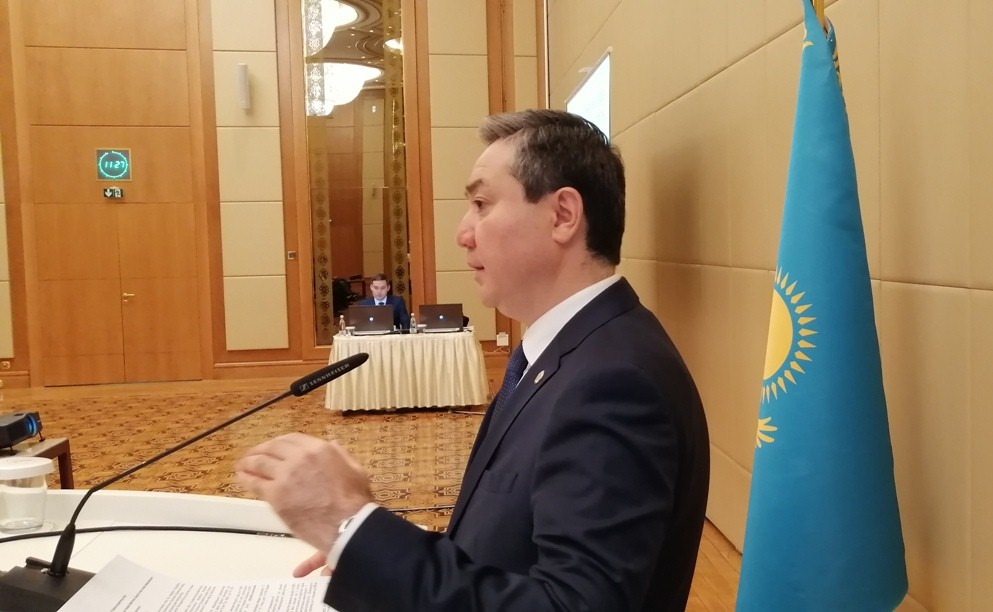
I express my deep gratitude to all of you for participating in our event.
Today, I would like to tell you about the socio-economic development of Kazakhstan, domestic political processes, foreign policy, main provisions of the Address of the President of our country, distinguished Kassym-Zhomart Kemelevich Tokayev to the people of Kazakhstan, as well as the plans for 2020.
As you know, this year the international financial organizations decrease forecasts for the growth of the global economy to the lowest levels over the past 10 years. So, the IMF – up to 3%, the WB – 2.6%.
Against the background of these forecasts, Kazakhstan’s GDP growth amounted to 4.4% for 10 months of this year. The growth was due to an increase in investment activity, the share of small and medium-sized businesses in GDP, domestic demand and the growth rate of the processing industry by 3.3%.
For the nine months of this year, the foreign trade turnover exceeded $70 billion, including export – $42.7 billion to 110 countries of the world.
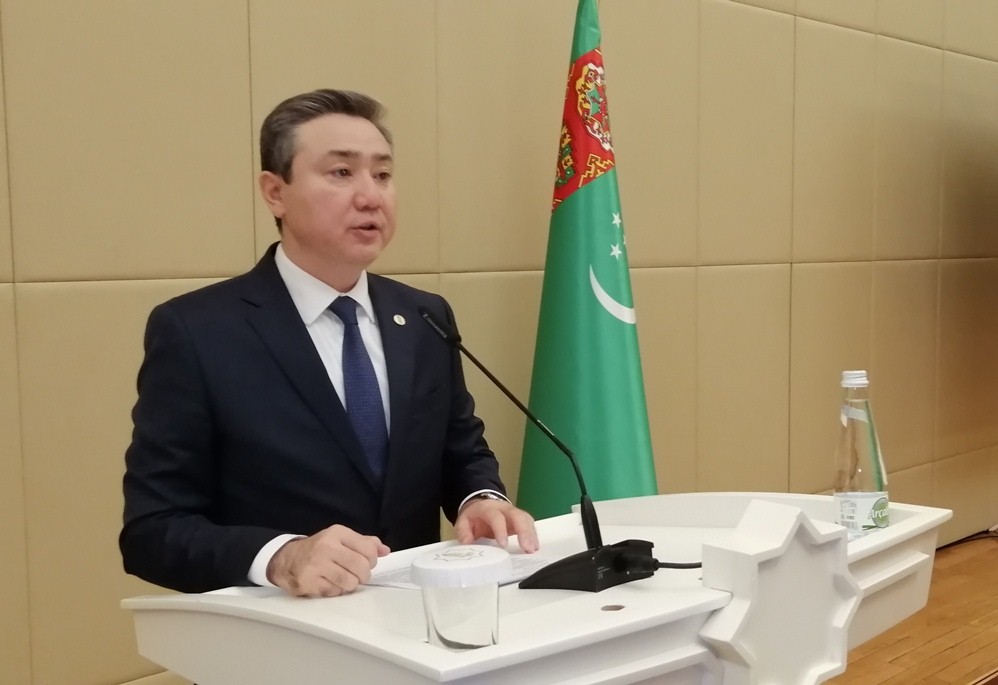
What did we achieve in 28 years of Independence?
Kazakhstan has a sovereign credit rating at the level of investment attractiveness from the international rating agencies (S&P, Fitch and Moody’s).
In Doing Business 2020 ranking, Kazakhstan confidently entered TOP 25 among 190 countries, improving its position by 3 points. For example, our country took the 4th place in the indicator “Enforcing Contracts”, and the 7th place – in “Protection of minority investors”.
In Global Competitiveness Index of the World Economic Forum, our country rose by 4 positions to the 55th place among 141 countries.
The investment climate is improving. There are 16,800 companies with foreign capital in Kazakhstan.
Over the 28 years, 320 billion US dollars of direct foreign investments were attracted to the economy of Kazakhstan, including 118 billion US dollars over the past five years. The main investing countries are the Netherlands (37.2 billion dollars), the USA (22.4 billion dollars), Switzerland (13.5 billion dollars), China (7.1 billion dollars), Russia (6.4 billion dollars), France (5.2 billion dollars) and Belgium (4.9 billion dollars).
Favourable immigration conditions are being formed. Visa-free arrangements for up to 30 days are valid for citizens of 57 countries of the world. Taking into account bilateral agreements on visa-free arrangements, citizens of 76 countries of the world can visit Kazakhstan without a visa.
Astana International Financial Centre is actively developing. Over the past two years, 285 companies registered on this platform. By the end of 2020, their number will increase to 500. The Court and the International Arbitration Centre were set up on the territory of the Centre to resolve investment disputes on the principles of the British law. Any investor, regardless of the place of implementation of his project in the country, can apply there for defence.
The transport and logistics infrastructure is developing. More than12.5 thousand km of roads and more than 2.5 thousand km of railways were built and reconstructed, renovation was carried out at 15 airports. Soon the Open Sky Regime will be in effect at 11 major airports in Kazakhstan. This will allow airlines from around the world using the fifth degree of freedom of the air traffic. The geography of flights expanded to 99 international air routes.
Transit land corridors were set up. From the East to the West and from the North to the South, access to the markets of Europe, South-Eastern Asia, China, Russia, Turkey and the Gulf countries is provided. One such corridor is Western Europe-Western China International Highway. Cargo from China is delivered to Europe via Kazakhstan in 10-15 days, while delivery via the South Sea route takes about 2 months.
Kazakhstan built a terminal in the Chinese port of Lianyungang, the dry port “Khorgos-East Gate” on the border with China, the capacity of the ports of Aktau and Kuryk on the Caspian Sea increased with the possibility of loading up to 27 million tons per year. Kazakhstan supports the revival of the Great Silk Road and the mega-project “One Belt – One Way” initiated by the PRC.
Kazakhstan is a large agricultural country and is one of the largest producers and exporters of grain. We have 26 million hectares of arable land. By 2030, the area of irrigated land will increase to 3 million hectares.
This year, the grain harvest amounted to more than 19 million tons, of which 7 million tons will be exported. As you know, Kazakhstan initiated the establishment of an international organization – the Islamic Organization for Food Security OIC. At present, 34 member states of the OIC are members of this organization.
Over the next three years, $232 million will be allocated for rural infrastructure development. These funds will go to the development of transport, water supply, gasification, repair and construction of schools, hospitals, sports grounds.
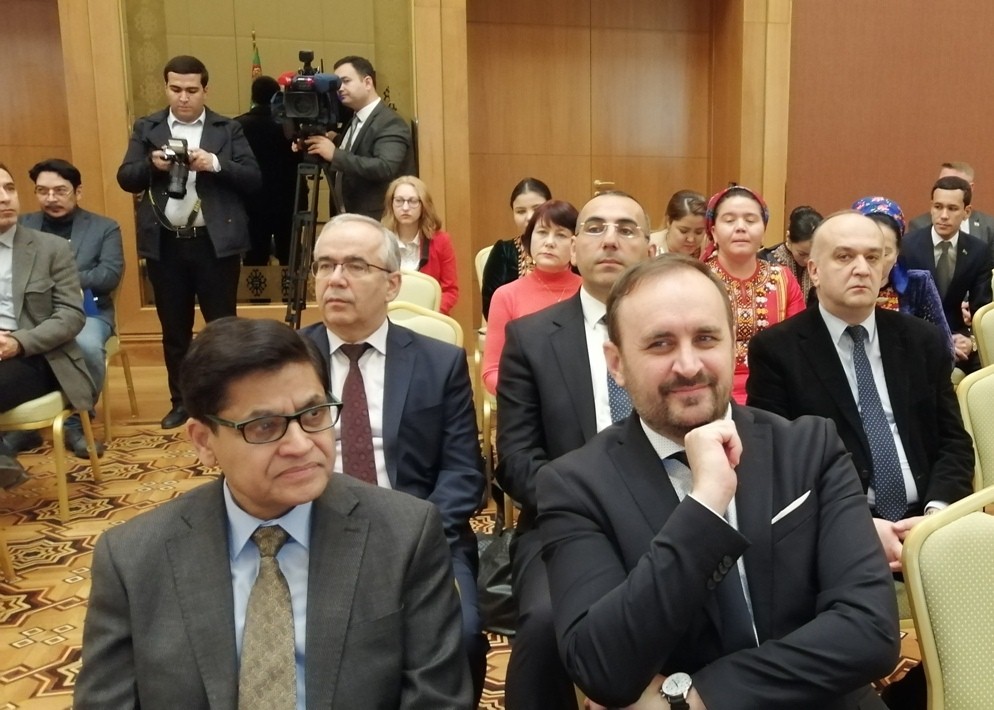
Our country is actively developing the social area.
In the area of healthcare, nuclear diagnostics, robotic kinesitherapy, tomotherapy and other high-tech services are provided. The country conducts 84 thousand cardiac operations per year. Six (6) medical organizations have JCI International Accreditation. Medical tourism is actively developing. Every year, foreigners from more than 45 countries of the world come to the clinics in Kazakhstan for medical treatment. Over the next three years, the state will allocate $7.2 billion to finance free medical care, and $619 million to provide housing for low-income large families; $644 million – to provide clean drinking water; $150 million – to create equal opportunities for people with special needs (persons with disabilities).
In the area of education, Bolashak International Programme is successfully operating. More than 13 thousand of our citizens received free education at the best universities of the world. In 2010, Kazakhstan joined the Bologna process and became a full-fledged member of the European educational space. To date, QS WUR ranking of the best universities of the world includes 10 Kazakhstan universities.
Dear colleagues!
This all could not be achieved without interethnic consent and interfaith mutual understanding in the society. Our model of interethnic and interfaith development became an international brand of the country long ago. I shall explain why.
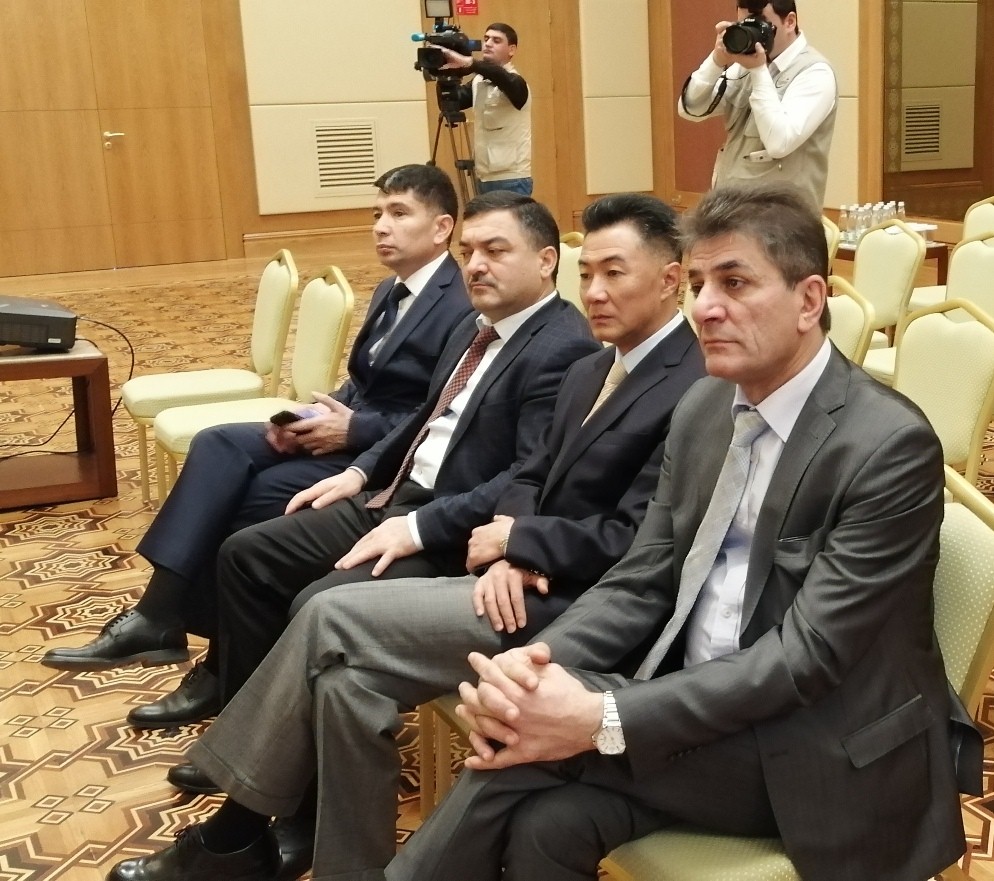
We live in peace and harmony with 126 nationalities and ethnic groups, speak 23 languages, practice Islam, Orthodoxy, Catholicism, Protestantism, Buddhism and Judaism. Education is provided in Uzbek, Tajik, Uighur and Ukrainian languages in 88 high schools. The mother languages of 22 nationalities are taught as separate subjects in 108 high schools. In 195 linguistic Centres, native languages of 30 nationalities are taught. Thirty five (35) newspapers and magazines are published in 15 languages, out of which the state finances the publication of 6 national newspapers. Radio programmes broadcast in 8, and television programmes in 7 languages. Fourteen (14) Russian, Uzbek, Uighur, Korean and German theatres, and 820 ethno-cultural associations function.
As you know, many nations [ethnic groups] were forcibly deported to Kazakhstan [during the Soviet period]. For example, in 1936 – 35.7 thousand Poles and 20 thousand Finns, in 1937 – 18.5 Koreans, in 1941-1942 – 500 thousand Germans, in 1943 – 69 thousand Karachays, in 1944 – 478 thousand Chechens and Ingush from the Caucasus, in 1944 – 70 thousand Meskhetin Turks and Kurds from Georgia, and 37 thousand Greeks.
We have a unique public institution that has no analogues in the world – the Assembly of the People of Kazakhstan. It has a constitutional status and is a full-fledged party of the political system. It elects 9 Deputies of the lower house of the Parliament – the Majilis. These Deputies represent the interests of all nationalities.
Dear friends!
Today’s briefing is taking place on the eve of the main national holiday of our country – Independence Day that we shall celebrate in Kazakhstan on December 16. Also, on December 16, I invite all of you to a reception in Ashgabat.
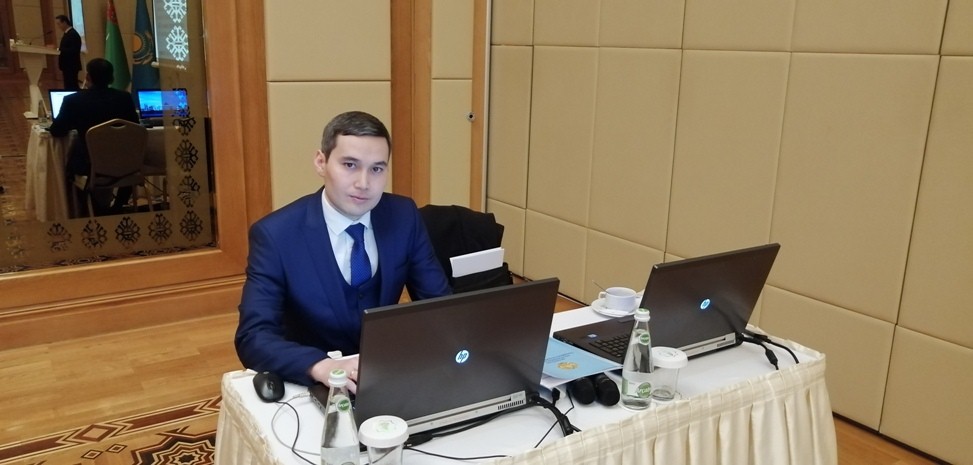
December 1, we widely celebrated the Day of the First President in Kazakhstan.
Our First President – Leader of the nation, distinguished Nursultan Abishevich Nazarbayev, laid the foundations of the state building. Today, under his wise leadership, Kazakhstan established itself as a successful, politically stable and dynamically developing state.
As you know, this year, an important political event took place in Kazakhstan – peaceful and open transition of power. N.A.Nazarbayev made a historic decision to terminate his powers as President. With voluntary resignation, he showed a unique example of the political leadership of an independent country.
June 9, an extraordinary presidential election was held. Distinguished Kassym-Zhomart Kemeluly Tokaev was elected the Head of the State.
The strategic development course laid down by our First President continues. Current activities of the Head of the State are based on three main principles – succession, justice and continuous development (progress).
On September 2, the Head of the State delivered his Address to the people of Kazakhstan. It defines the priorities for the further development of our country, political modernization and democratization of the society. I would like to briefly voice the main guidelines of the Address.
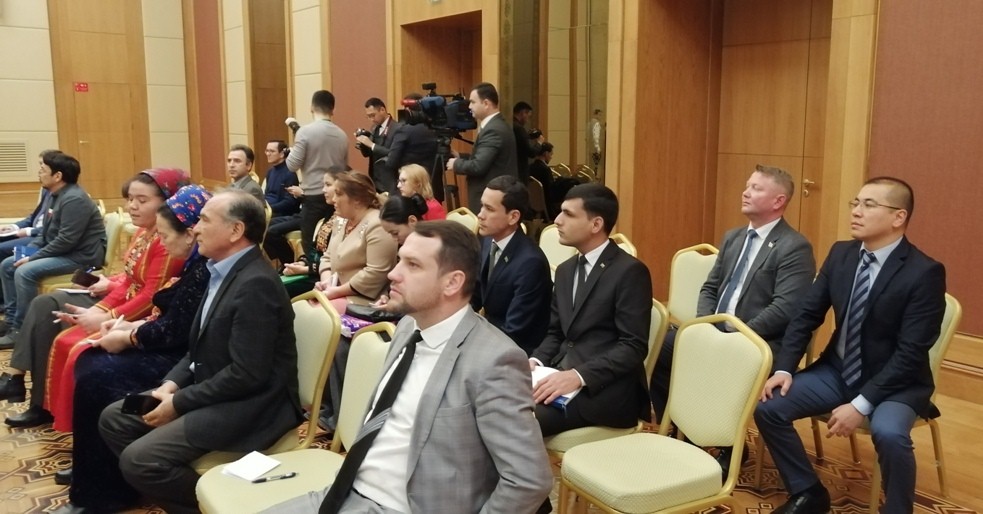
Kazakhstan will develop according to the formula “Strong President – influential Parliament – accountable Government.”
“Hearing State.” This means that the Government will promptly and efficiently respond to the requests and suggestions of the citizens.
Constant dialogue between the authorities and society will strengthen. The activities of the National Council of Public Confidence are intensifying.
A multi-party system, political competition and pluralism of opinions will develop.
Reforms of the judicial and law enforcement systems will continue, including digitalization of this area.
Today, citizens file a lawsuit in court in online mode in Kazakhstan. On average, over 1 million documents are received per year. Today, 90% of claims are filed electronically.
These steps benefit not only Kazakh citizens, but also our foreign guests and tourists. In the near future, the compulsory registration of foreigners with the migration authorities upon arrival in Kazakhstan will be abolished.
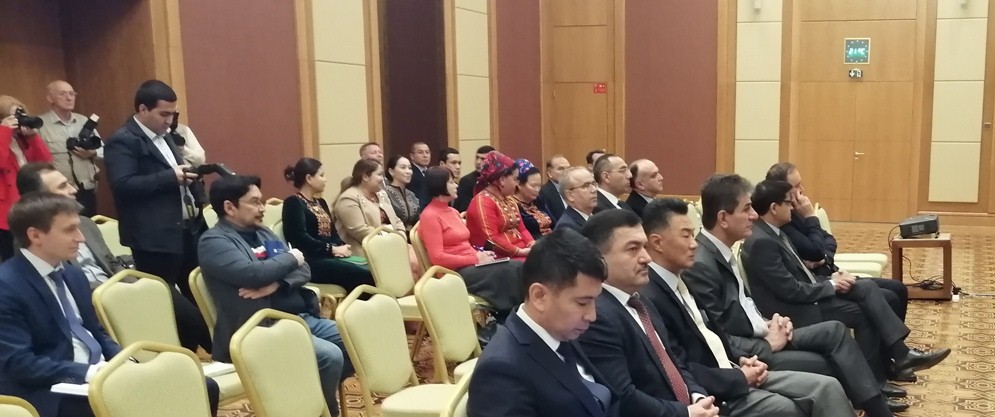
Over the next three years, the state will allocate $446 million for the reform of the law enforcement bodies and the rule of law, including salary increase for the police officers – $103 million.
Support for entrepreneurship as an important area of the economy will continue. Over the next three years, the state will allocate $644 million to support small and medium-sized businesses. Also, for three years, micro and small business companies will be exempt from revenue taxes.
As for the foreign policy area – The creator of a multi-vector and predictable foreign policy is the Leader of the nation – distinguished Nursultan Abishevich Nazarbayev. Kazakhstan will maintain the continuity of the previous foreign policy.
Our country will continue to promote and support constructive initiatives aimed at ensuring regional and global stability. This is the strengthening of Asian and Euro-Asian security, the prevention of nuclear and terrorist threats.
The priority area of the foreign policy remains the active participation of Kazakhstan in the process of achieving a world free of nuclear weapons. As you know, after the collapse of the Soviet Union Kazakhstan voluntarily abandoned the fourth largest nuclear arsenal in the world. This is a significant contribution to strengthening global security.
Therefore, it is us, who are at the forefront of the global movement for the elimination of nuclear weapons. Our country suffered the bitterness of an environmental disaster from nuclear testing. Over 40 years of activity, from 1949 to 1989, 456 nuclear tests took place at the Semipalatinsk nuclear test site in Kazakhstan. The power of all the explosions was 2500 times stronger than the power of the bomb dropped on Hiroshima. According to various estimates, 1.5 million people suffered from the nuclear tests.
In 2006, the Central Asian countries established a nuclear-weapon-free zone. In 2015, the UN General Assembly adopted the Universal Declaration on Building a World Free of Nuclear Weapons.
Kazakhstan ratified the Treaty for the Prohibition of Nuclear Weapons.
Our country is contributing to the peaceful use of atomic energy and strengthening the nuclear non-proliferation regime. Kazakhstan is implementing a unique international project to establish the IAEA Low Enriched Uranium Bank. The Bank will store 90 metric tons of uranium hexafluoride suitable for the manufacture of fuel for nuclear power plants. This uranium reserve is provided in case the IAEA Member States face the cessation of traditional fuel supplies for political reasons.
Implementation of such foreign policy initiatives as CICA and the Congress of Leaders of the World and Traditional Religions will continue.
Asia’s growing economic strength requires more integrated continental security architecture.
Kazakhstan proposes transforming the Conference on Interaction and Confidence-Building Measures in Asia (CICA) into a full-fledged regional organization for security and development. In 2020, Kazakhstan will chair CICA.
Global interfaith harmony remains in the focus of our foreign policy. Congresses of Leaders of the World and Traditional Religions are regularly held in the capital of Kazakhstan. They contribute to the development of global interreligious dialogue, the unification of the spiritual and moral potential of the world religions, and prevent confrontation of faiths. As I said earlier, we have rich experience in interethnic and interreligious harmony.
Kazakhstan makes its contribution to the regional and global security. Our capital provides a platform for inter-Syrian negotiations. Thirteen (13) such meetings have already taken place. Thanks to Astana process that complements Geneva talks, cessation of hostilities has been achieved. De-escalation zones have also been established with conditions for safe return of refugees. Kazakhstan firmly adheres to the position that a solution to the inter-Syrian conflict is possible only peacefully.
Kazakhstan condemns terrorism in all its forms and manifestations. We initiated signing of the Code of Conduct for a world free of terrorism by the centenary of the United Nations in 2045. To date, about 90 countries have joined the Code.
This year, Kazakhstan successfully conducted a special humanitarian mission “Zhusan” in cooperation with our international partners. As a result, 595 citizens of Kazakhstan who were trapped in terrorist propaganda, including 406 children, returned home from war zones in Syria.
A policy of constructive and balanced interaction with strategic partners and all interested countries will continue. Currently, 70 embassies of foreign countries and 30 international organizations operate in the capital of our country.
Kazakhstan is strengthening strategic partnership in all areas and fields with the Russian Federation. In April, distinguished Kassym-Zhomart Kemeluly Tokayev, President of the Republic of Kazakhstan, paid an official visit to Russia.
Multifaceted strategic partnership is developing with the People’s Republic of China. In September, the President of Kazakhstan paid a state visit to China. Our country supports China’s large-scale initiative “One Belt, One Way” and is actively participating in this project.
Long-term strategic partnership with the United States is deepening. For Kazakhstan, deepening a long-term strategic partnership with the United States of America is also a priority. Both sides are actively implementing the agreements reached during the visit of the First President Nursultan Nazarbayev to the United States last year.
Cooperation is developing with our major trade and investment partner, the European Union, in the spirit of constructive dialogue.
Our relations with the European Union are also developing in the spirit of constructive dialogue and multifaceted cooperation. In May of this year, the President of the European Council Donald Tusk paid a fruitful visit to our capital. In July, a new EU strategy for Central Asia was adopted, which sets the priorities for interaction between the European Union and our region for the coming years. This has become a vital new impetus for expanding the partnership and cooperation between Kazakhstan and the EU.
We also intend to build up mutually beneficial partnership with European countries on a bilateral basis.
We are gradually expanding meaningful cooperation with reliable partners from the CIS, Turkey, Iran, Asia and the Middle East.
This cooperation is extremely important for Kazakhstan. We intend to bring our peoples closer together, to give a new impetus to our multifaceted ties.
Cooperation with the countries of Central Asia – Turkmenistan, Uzbekistan, Kyrgyzstan and Tajikistan is strengthening. Our countries are connected with strong ties of a common historical and cultural heritage. In April, the President of the Republic of Kazakhstan, distinguished Kassym-Zhomart Kemeluly Tokayev, paid a state visit to Uzbekistan, and in November – a state visit to Kyrgyzstan.
A close and constructive political dialogue between all five countries of the region will facilitate trade, economic, investment and cultural-humanitarian interaction.
Turkmenistan is an important strategic partner both in Central Asia and in the Caspian region. A constructive political dialogue was established between our countries. Kazakhstan is interested in further expanding trade relations with Turkmenistan, as well as in strengthening interregional, cultural and humanitarian ties.
Kazakhstan is also participating in the efforts of the international community to facilitate the process of national reconciliation in Afghanistan. We actively contribute to the socio-economic development of this state, the elimination of threats to regional and global security.
Kazakhstan is a reliable partner of the United Nations. In the status of a non-permanent member of the UN Security Council over the previous two years, we focused on strengthening security, non-proliferation and regional cooperation. Kazakhstan contributes to UN peacekeeping operations. Together with our Indian partners, we deployed a unit of 120 troops as part of the UN Interim Force in Lebanon.
In May of this year in Almaty, the Building of International Organizations was opened, that housed 16 UN agencies. Now we propose establishing the UN Centre for Sustainable Development Goals on its basis with the mandate of assisting the countries of Central Asia and Afghanistan.
We pay particular attention to full implementation of 2030 Agenda. The SDGs are 80% integrated into our strategic government programmes. Since 2016, permanent monitoring mechanism for the implementation of the SDGs has been operating in Kazakhstan by the Coordination Council under the leadership of the Deputy Prime Minister. It consists of representatives of government bodies, NGOs, UN Agencies and other international organizations.
The constructive work in the Commonwealth of Independent States is of great importance to us. In 2021, the Chairmanship of this organization will pass to Kazakhstan. Important for us is the strengthening of Eurasian integration, primarily in the framework of the Eurasian Economic Union.
Kazakhstan intends to continue active work in the Shanghai Cooperation Organization. The SCO became an influential factor in the regional security and cooperation.
We also develop multilateral cooperation with the interested countries within the framework of the Collective Security Treaty Organization, the Organization for Security and Cooperation in Europe, the Organization of Islamic Cooperation, the Turkic Council, TURKSOY, the Organization for Economic Cooperation, and the UN sheltered organizations.
Dear Ladies and Gentlemen!
Next year we shall celebrate the 175th anniversary of the Kazakh poet and enlightener Abay, the 1150th anniversary of Abu Nasr Al-Farabi, the 25th anniversary of the Constitution and Assembly of the People of Kazakhstan. Preparations will begin for the celebration of the 30th Independence of the Republic of Kazakhstan. We shall also hold similar events here in Ashgabat, and I hope with you in the same format.
At the end of my speech, I would like to once again congratulate the distinguished President of Turkmenistan on the International Day of Neutrality, wish him good health and success in his responsible state activities, and to the fraternal Turkmen people –wellbeing and prosperity.
Once again, I express my sincere appreciation to all guests for participation. My congratulations with the coming New Year to all! I wish you good health and success in New Year!
Thank you for your attention!
Questions by media
Answering a question by AFP, the ambassador said that the mutual trade turnover with Turkmenistan this year was about USD 120 million.
In response to a question by Reuters, the ambassador said the direct participation of Kazakhstan in TAPI was not under active consideration at present. /// nCa, 16 December 2019